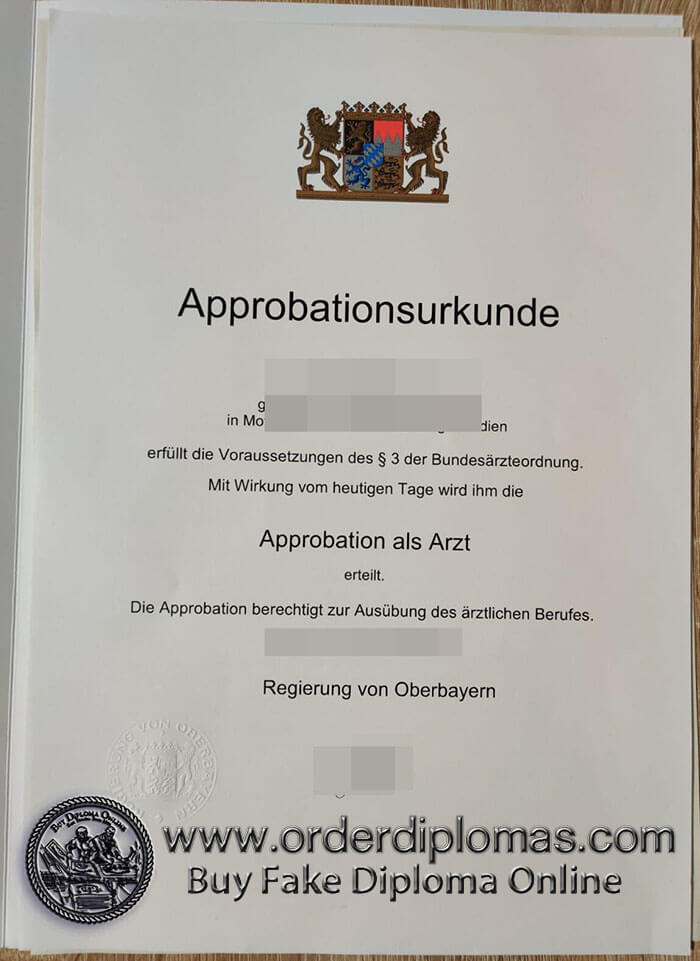
buy fake Approbationsurkunde certificate
How to buy a fake Approbation als Arzt certificate? where to buy a fake Approbationsurkunde certificate? buy fake diploma, buy fake degree, buy fake certificate. buy fake Approbationsurkunde certificate. buy Approbationsurkunde dipoma. buy fake Medical license diploma, buy fake Medical license degree, buy fake Medical license certificate.
A medical license is an occupational license that permits a person to legally practice medicine. Most nations require such a license, bestowed either by a specified government-approved professional association or a government agency. Licenses are not granted automatically to all people with medical degrees. A medical school graduate must receive a license to practice medicine to legally be called a physician. The process typically requires testing by a medical board. The medical license is the documentation of authority to practice medicine within a certain locality. An active license is also required to practice medicine as an Assistant Physician, a Physician assistant or a Clinical officer in jurisdictions with authorizing legislation.
A professional may have their license removed due to if they are not deemed fit to practise, such as due to a lack of competence, health reasons, or ethical violations.: 6 The license will limit a professionals scope of practice.
In Germany, licensing of doctors (“Approbation”) is the responsibility of the state governments. Licensed doctors are compulsory members of “Ärztekammern” (literally: “Physician chambers”), which are medical associations organized on state level. buy fake diploma, buy fake degree, buy fake certificate. buy fake Approbationsurkunde certificate. buy fake Medical license certificate. Criteria for licensing of doctors are regulated in the Approbationsordnung für Ärzte, which is a piece of federal law. According to the licensing regulations, the physician must have successfully completed his medical studies and passed the (final) examination. He or she must not have engaged in negative behavior that would raise clear concerns about his or her suitability (e.g., practicing a criminal offense). Furthermore, the physician must meet the health requirements and have sufficient German language skills to be able to perform the profession.
Physicians who have not studied medicine in Germany, among others, must prove their language skills by means of a German B2 certificate and a successfully completed Fachsprachprüfung. In addition, doctors who have not studied in the EU, EEA or Switzerland must prove that their studies are equivalent. For this purpose, they usually have to pass a Kenntnisprüfung.
The Bill of Rights, passed in 1791, gave states the right to regulate health. In 1811, Ohio passed legislation licensing physicians but repealed these laws in 1833. In 1817, Illinois legislated the medical practice, but had repealed these laws by 1826.[14]: 40
The American Medical Association when formed in 1847, proposed that the state legislate medicine (rather than each of the different medical schools). Horowitz argues that this suggestion was in order to gain greater control over medical education.: 38
In the 1870s, almost all U.S. physicians were still unlicensed. So-called “regular”, physicians were typically educated in American medical schools and earned medical degree M.D. The “irregulars” typically fit into two distinct sects: Homeopaths or Eclectics. Homeopaths were physicians that were trained to practice a medical system known as Homeopathy that was developed by Samuel Hahnemann. Eclectics physicians also attended medical schools, but their practice mixed Thomsonsianism and some regular medical practice. Each of these sects was organized into both national and state medical societies across the United States.
In 1877, the Illinois legislature passed the Illinois medical licensing law, which led to the aggressive prosecution of physicians that were perceived as illegal or unethical. Medical boards of other states (often composed of both regular and irregular physicians) followed suit. Some authors claim that these efforts allowed organized regular and irregular physicians to exclude not only fraudulent practitioners, but unorganized sects, including midwives, clairvoyants, osteopaths, Christian Scientists, and magnetic healers.
In Dent v. West Virginia, 129 U.S. 114 (1889), the U.S. Supreme Court for the first time upheld a state physician licensing law. A practitioner with insufficient credentials to obtain a medical license sued West Virginia, claiming a violation of his rights under the due process clause of the 14th Amendment. The Supreme Court upheld the statute noting that, while each citizen had a right to follow any lawful calling, they were subject to reasonable state restrictions. Because of the nature of medical training, the large amount of knowledge required, and the life-and-death circumstances with which physicians dealt, patients needed to rely on the assurance of a license requiring physicians to meet a minimum set of standards.

 USA Diplomas
USA Diplomas Canada Diplomas
Canada Diplomas UK Diplomas
UK Diplomas Australia Diplomas
Australia Diplomas Germany Diplomas
Germany Diplomas Malaysia Diplomas
Malaysia Diplomas Singapore Diplomas
Singapore Diplomas Other countries
Other countries Transcript-Form.xlsx
Transcript-Form.xlsx
